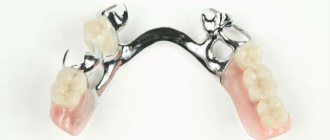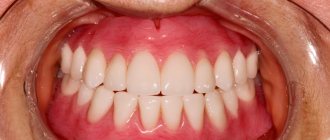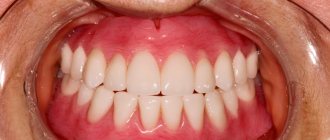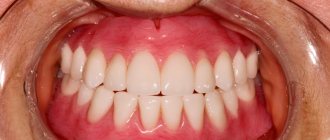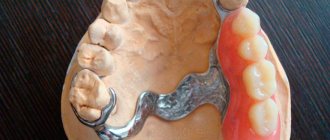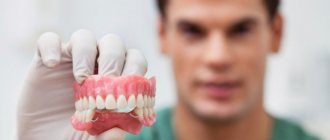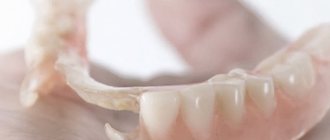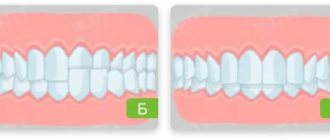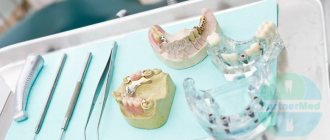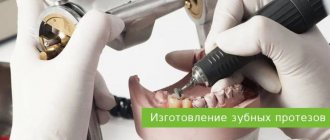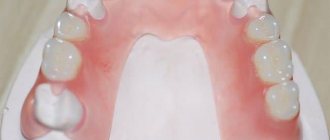Completely removable dentures are used for prosthetics of jaws that are completely devoid of teeth (in the case of edentia). The prosthesis is held on the jaw due to its tight fit to the tissues of the prosthetic bed. If we are talking about a prosthesis for the upper jaw, then high-quality fixation can be achieved through a special valve that creates negative pressure, that is, in essence, the prosthesis is held in place by vacuum. Traditionally, dentures for the lower jaw are very uncomfortable, this is due to poor conditions for their reliable fixation. Specially developed adhesive pastes and creams can help keep the prosthesis in place; they significantly improve the retention (fit) of the structure. Often, such dentures are made of acrylic plastic, with the help of special dyes, it is given the color and shade of the patient’s gums so that it does not stand out against the background of the oral cavity, and artificial teeth are mounted into it, which exactly imitate a person’s normal bite.
The process of getting used to dentures (full or partial) is often long and difficult
Thanks to such products, patients can enjoy life again, eat whatever they want (and even what they could not afford before), since chewing function is completely restored. Without the use of this type of prosthesis, you can forget about normal trips to catering establishments or family feasts, since such a person will not be able to afford anything other than yogurt or puree.
But the question arises - how to get used to dentures ? The process of getting used to removable dentures is very long and often difficult. Such prosthetics cannot be called a complete procedure, since the oral mucosa is constantly irritated, and the patient himself experiences discomfort.
What problems may arise after installing a denture?
Adaptation to a removable denture begins almost immediately after installation is completed in the dentist's office. And, according to statistics, almost every patient experiences certain difficulties that are associated with the adaptation period. Here are some of them:
- Vomiting reflex . Constant vomiting is a completely normal reaction of the body to a foreign object in the oral cavity, so there is no need to worry too much about this. But there is a category of people who take the longest to get used to dentures, or who don’t get used to them at all. The installation of products that stick to the sky is contraindicated for them. This must be taken into account when choosing a prosthetic method. Often, this problem goes away on its own. But for patients with hypersensitivity, it is better to abandon such structures altogether.
- Profuse salivation . The human body perceives the prosthesis as food, as a result of which the brain sends signals that then activate the corresponding functions, namely the secretion of saliva and gastric juice.
- Unpleasant sensations while eating . First of all, this problem affects the owners of removable dentures; the load is unevenly distributed across the jaw, in contrast to the natural chewing of food with real teeth. It takes a long time to get used to this.
- Perception of taste . You may partially lose your sense of taste, since not only the tongue (as many believe), but also the rest of the oral cavity is involved in its perception. The patient may stop feeling spicy, salty, hot or sweet foods; this process occurs differently for everyone.
- Distortion of speech . The prosthesis and its protruding parts can interfere with the tongue; a person with an installed prosthesis has difficulty pronouncing words. But after some time (about a week), diction returns to normal.
Advantages
- Orthodontic structures made of nylon break very rarely, which cannot be said about their acrylic counterparts, in which fracture of the bases is the main problem, occurring in 80% of cases.
- Hypoallergenic. Such products cannot cause an allergic reaction. And this is easy to prove with a simple example: after polymerization of acrylic, its composition contains up to 10% of the liquid (monomer) used to carry out this process. This substance is a strong allergen, and it can be released for five years from the date of installation of the structure. Nylon dentures do not contain monomer.
- Installation of the product does not imply grinding of the supporting teeth, that is, they are not required to be prepared.
- The absence of metal elements is a significant advantage, because they are too noticeable when talking and smiling. The nylon orthodontic structure is completely indistinguishable from real teeth.
- If the product is made correctly, it will not rub the gums and will not cause discomfort.
- Nylon has a uniform structure, which is explained by the peculiarities of its production, which means that a product made from it will fit as tightly as possible to the gum.
- Inability to color and absorb moisture are very important characteristics of the material.
- Such structures do not tend to loosen the supporting teeth, which is very important if they are affected by periodontitis. It is noteworthy that it is possible to get dentures in this way even if you have some dental diseases, and this method even allows you to strengthen your dentition, which greatly contributes to a speedy recovery.
- Reliable fixation without glue, gel and crowns, which is the merit of clasps.
- A nylon prosthesis, the price of which is affordable for almost everyone, is designed for 5-7 years of intensive use. But only if you follow all the care recommendations that a specialist from the A-Medic clinic will certainly give.
Opinions are divided!
Some patients are completely satisfied with orthodontic structures made of nylon, while others, on the contrary, tend to abandon them and give preference to acrylic analogues. Why is that? Because the Earth is full of rumors, and reviews read on the Internet and the opinions of friends who have had negative experiences wearing nylon prostheses can play a cruel joke on the patient. Where did this stereotype come from? The fact is that the first nylon structures were very soft and elastic, and at first foreign dentists used them only for temporary prosthetics, since the cost of nylon dentures was very affordable.
Their appearance in Russia greatly delighted less than honest dentists, who began recommending to their patients the installation of just such dentures, rather than acrylic ones. This “aggressive marketing” did not benefit ordinary people, since the structures lasted no more than three years, and doctors claimed that they were designed for a longer operational period.
In addition, the surface of the material, due to its softness, was poorly polished, and the orthodontic product itself was not the height of perfection and caused a lot of inconvenience when worn for a long time. All this became the reason for the emergence of stereotypes, which are helped to be broken by fundamentally new designs made from more modern and “adapted” varieties of nylon. By the way, a specialist at the A-Medic clinic can select the most suitable material for the patient.
Useful tips for those who have recently installed a prosthesis
Literally from the first days of using a prosthesis, many patients complain of pain, as well as abrasions and scratches in the oral cavity. In fact, mechanical damage should not occur, since this point was thought out at the product design stage. Perhaps you are simply wearing it incorrectly. If the problem does not resolve itself, you need to contact your dentist for further adjustments to the prosthesis.
The tips given below will not completely relieve you of difficulties during the adaptation period, but they will significantly reduce the level of negative impact and will help you get used to the prosthesis faster.
The process of chewing food causes pain, so in the first few weeks it is better to protect yourself from eating solid and tough foods: meat, nuts, cookies, etc. If even soft food is painful to chew, then at first you can cut it into small pieces. Trust your feelings, and when the pain begins to subside, gradually move on to your usual, normal diet.
Under no circumstances should you reduce the number of meals. Most patients, due to a strong fear of getting damage to the oral cavity (and they take a very long time to heal), switch to liquid foods and yoghurts. But this is not the right solution, since in order to get used to the prosthesis, a constant chewing load is needed.
Foods such as pears, apples and citrus fruits should be cut into small pieces and chewed slowly, with great effort. This allows you to reduce the degree of damage to the mucous membrane, and also gives the body all the necessary vitamins.
If you have a dry mouth or increased salivation, it is recommended to drink plenty of liquid in small sips throughout the day.
If you feel slight numbness, you can do a light massage of the gums, this will improve blood circulation and the numbness will go away in just a few minutes. In this case, you need to remove the prosthesis.
Decoctions of herbs such as sage and chamomile will help strengthen your gums and prevent irritation. It is advisable to carry out the procedure three times a day. The decoction should never be hot; liquid at room temperature is the best option.
Accelerate the process of getting used to the prosthesis
- Rinse your mouth with a salt solution;
- Take the process of cleaning your denture seriously;
- Try sucking on lollipops, this process calms you down and distracts you from having a foreign object in your mouth;
- To improve your diction, say tongue twisters, read aloud, and speak more often. It’s also worth trying to pronounce words louder. Often, normal speech is restored within a few weeks;
- For a more reliable fixation of the prosthesis in the oral cavity, it is best to use special gels and ointments; they not only allow you to securely fix the product in the mouth, but also prevent the appearance of abrasion wounds and other mechanical damage to the oral cavity.
- It is necessary to completely exclude various sticky foods from the diet, and not only for the period of getting used to the prosthesis. These can be candies, various chocolate bars with nougat, toffees, etc.), they can not only cause discomfort during chewing, but also damage the structure.
What to do if the addiction is seriously delayed?
If, over a fairly long period of time, you cannot get used to the prosthesis (that is, to a foreign body in the mouth), then there may be several logical explanations for this problem:
- Jaw atrophy;
- Individual characteristics of the jaw structure of a particular patient;
- Poor fixation of the structure;
The most difficult thing to get used to is the so-called clasp structures, which are based on fastenings made of metal. In addition to mechanical effects, exposed metal parts can also have chemical effects, reacting with the acidic environment of the oral cavity. It is simply impossible to correct such a product on your own, as it is easily damaged. Therefore, if you have the feeling that such a design is rather poorly and unreliably fixed in your mouth, it is better to go to a specialist. If the mobility of the prosthesis inside the oral cavity is due to jaw atrophy, a special ointment for additional fixation can help you.
Repair and correction of defects
Many patients are very interested in this particular question, because dentures are not cheap. Repairing removable structures is quite possible if the crowns, that is, artificial teeth, are damaged.
If damage occurs on the base, then unfortunately the entire prosthesis will have to be replaced. Minor imperfections that appear on crowns can be corrected using special materials. The base is made as one piece at a time. If a removable denture breaks, it will have to be replaced with a new one.
Terms of adaptation
For some, the feeling of discomfort passes quite quickly; for others, the adaptation process is inevitably associated with prolonged physical suffering.
Talking about exact dates is quite problematic, because quite a few factors play a role here. For example, the condition of the patient’s gums at the time of installation of the prosthesis. Severely damaged gums will begin to actively rub against the surface of the product, this will cause even greater irritation. In this case, the adaptation process will drag on for several months. The period of adaptation increases significantly when installing clasp dentures; this type of construction has many metal parts that easily damage the soft tissues of the oral cavity.
Psychological state is an important factor in the process of getting used to dentures. A person who experiences stress, is constantly nervous and tries to remove the prosthesis at the first opportunity, himself prolongs the adaptation period, and quite significantly.
If we talk about averages, then for most patients the adaptation period takes approximately two (2) weeks . The reasons listed above can guarantee to increase the period of adaptation to several months.
Material
For the manufacture of orthodontic structures, dental nylon is used, endowed with some useful properties.
For example, it is flexible and very similar in appearance to real fabrics. Sometimes flexible nylon dentures are called “invisible”, and this is true, because they literally merge with the mucous membrane and look very realistic. And from the outside it is not at all noticeable that a person’s teeth are not “his own”, but artificial. Dental nylon has such a property as softness. This material is pleasant to the touch, despite the fact that it is a type of plastic. Ordinary plastic, from which orthodontic structures were previously made (and are still made) has a number of serious disadvantages. For example, products made from it rub the gums and are highly hard, which means that when wearing a plastic prosthesis, a person experiences not the most pleasant sensations and even discomfort. It is noteworthy that flexible nylon dentures are fixed to the supporting teeth using soft clasps.
Caring for a removable denture
Proper care of the prosthesis is the key to the fastest possible adaptation. For those people who have previously carefully cared for their oral cavity and teeth, the process of caring for a denture will not become something scary and overly intrusive. You just need to learn a few simple rules:
- Rinse your mouth after every meal. It would also be a good idea to rinse the structure itself. Simply remove it from your mouth and rinse thoroughly under running water;
- Every morning, the denture must be cleaned with a brush and a special paste. Each type of prosthesis has its own accessories, which are selected separately. During the cleaning process, special attention should be paid to the inside of the prosthesis, this is where a huge number of different microorganisms accumulate, and food particles also become clogged. Otherwise, they can cause severe gum inflammation.
- Additional disinfection is still necessary. To carry it out, you will need to purchase some additional funds. In most cases, these are ointments or effervescent tablets, into the solution of which the prosthesis is dipped.
Some products for the care of dentures
Read about dental prosthetics in St. Petersburg in the article.
Moscow metro station Zvezdnaya, Danube Avenue, 23
